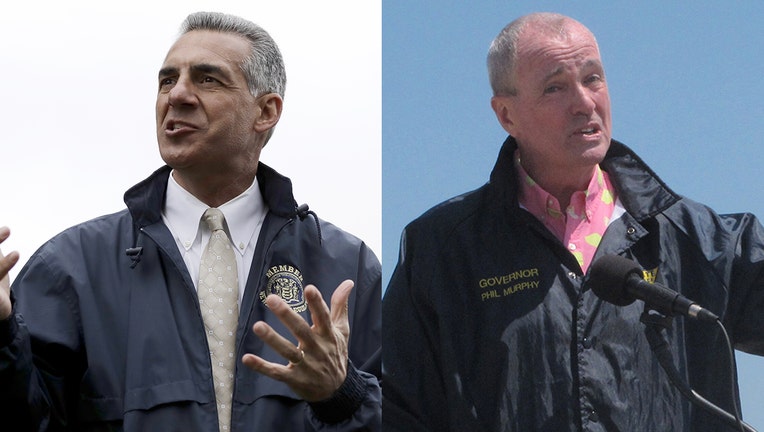Race for NJ governor: Democrat Phil Murphy to face Republican Jack Ciattarelli

Republican Jack Ciattarelli, left, will face Democrat Phil Murphy, the incumbent, in the race for governor of New Jersey. (AP Photos)
TRENTON, N.J. (AP) - New Jersey Gov. Phil Murphy charged into the general election, winning an uncontested Democratic primary on Tuesday and warning that "truth" itself is on the ballot in the fall.
His victory sets him up for a fall reelection campaign where his handling of COVID-19 and his first term will be front and center, but Murphy, during an energetic victory speech Tuesday night, attacked the Republican Party as relying on a "pack of lies." The speech hinted at former President Donald Trump who has falsely said he won the 2020 election, but Murphy didn't mention him or any of the Republicans vying to take him on in November by name. He contrasted the GOP with Democrats, who he argued rely on facts and science.
Jack Ciattarelli, the small business founder and former Assembly member, won New Jersey's Republican primary for governor Tuesday, defeating rivals who claimed former President Donald Trump's mantle.
"Truth is on the ballot," Murphy said. "The choice by the way in this statewide election ... I think the contrast in this general election will be as stark as there has ever been."
Murphy on Tuesday didn't mention his predecessor, two-term Republican Chris Christie, but did cast the general election as a choice between Murphy's policies, like phasing in a $15-an-hour minimum wage and raising taxes on millionaires, and Christie's, who tightened the state budget, sought public pension reforms and opposed raising the minimum wage and higher taxes.
"We can either keep New Jersey moving forward or go backward. It's a choice between standing for higher wages or going back to an economy that only worked for the wealthy and well-connected," Murphy said in a statement.
Ciattarelli defeated three challengers, two of whom promoted themselves as vocal Trump supporters. They were Hirsh Singh, an engineer from Atlantic County and Hudson County pastor and former real estate developer Phil Rizzo. Both men invoked the president as part of their efforts to win over the GOP vote in Democratic-leaning New Jersey.
But Ciattarelli won on the strength of his support among many in the party establishment, who delivered him coveted ballot position across the state. He's also cultivated a following since four years ago when he lost the GOP nomination to then Lt. Gov. Kim Guadagno. Ciattarelli signaled his plans to take on Murphy early — almost as soon as Murphy took office in 2018.
Despite attacks from Rizzo and Singh, Ciattarelli refuted that he didn't support Trump, even buying 3,000 Trump-Pence lawn signs.
Responding to critiques that he was a "never-Trumper," Ciattarelli said he changed his mind since criticizing Trump early on.
"A whole lot of us said a whole lot of things," he said during an interview with Harry Hurley on WPMG. "He earned my faith and confidence in the sense that his policies worked for the nation."
Ciattarelli focused much of his primary race on attacking Murphy over his handling of the coronavirus outbreak and on bread-and-butter Republican issues like high property taxes. He also was the biggest GOP fundraiser, bringing in about $7 million and qualifying for public matching funds. Only Murphy raised more money than Ciattarelli.
Ciattarelli served in the Assembly, representing the 16th District, getting elected in 2011 and serving until 2018. He started a medical publishing company and is also trained as a certified public accountant.
Murphy, a former executive at Goldman Sachs and an ambassador to Germany in Barack Obama's administration, won his first ever election in 2017 becoming New Jersey's 56th governor.
He campaigned and governed as a progressive liberal. Over his first term, Murphy signed laws hiking taxes on millionaires, boosting funding for schools, Planned Parenthood and the state's share of the public pension. He also signed a bill setting up a legal recreational marijuana market, which still is in its infancy and being debated by state regulators.
But no conversation of Murphy's record is complete without discussing his handling of COVID-19, which has claimed some nearly 24,000 lives and resulted in businesses shuttering as a result of coronavirus mitigation efforts.
Murphy, who was little known during his first primary campaign four years ago, became a fixture in many people's daily lives as he delivered updates on the virus, eventually scaling back to just three days a week and sometimes less frequently as the vaccinations picked up.
While New Jersey was an early hotspot and its long-term care and veterans homes were ravaged, the state has also been at the forefront of getting people vaccinated. About half of the state's population is fully vaccinated compared with 41% nationwide, according to the Centers for Disease Control and Prevention.
Democrats have seen their registration advantage over Republicans climb to more than 1 million. Murphy has gotten good grades from voters for his handling of the pandemic, according to public surveys.
Nevertheless, Republicans have hammered him for keeping mask and distancing mandates in place for what they have said is too long and for more than 8,000 deaths at long-term care facilities.
A Democrat hasn't won reelection in New Jersey in more than four decades, while Republicans in recent decades — Chris Christie and Tom Kean Sr. — have.
Also on the ballot Tuesday were the state's Assembly and state Senate seats, though many lawmakers didn't face challenges.
Democrats hold a 52-28 majority in the Assembly and a 25-15 advantage in the Senate.

